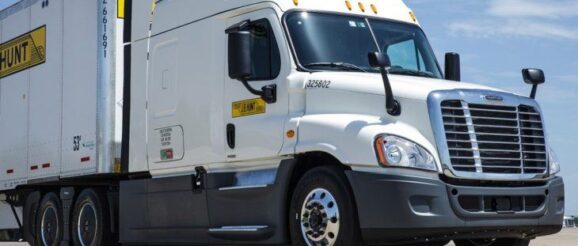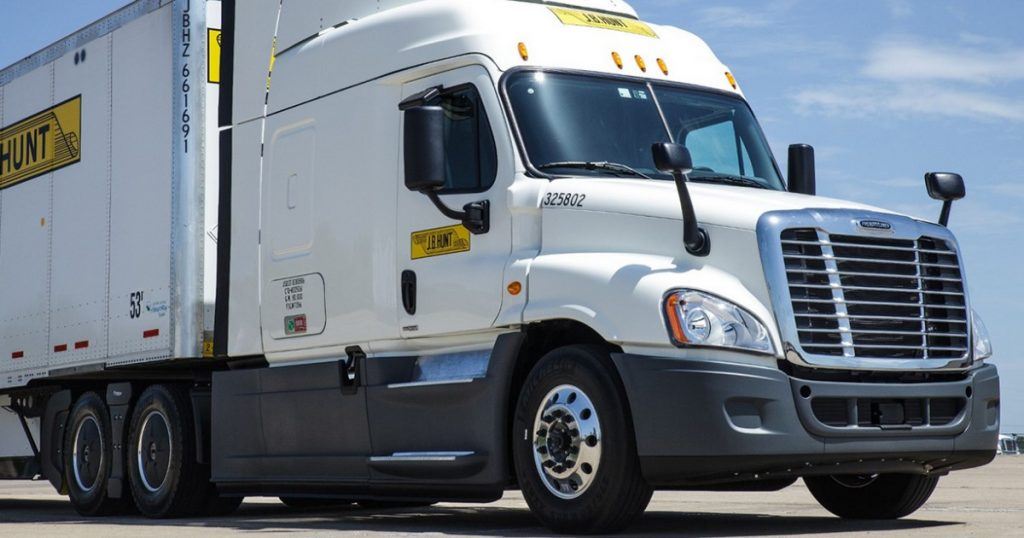Simpson: COVID-19 pandemic speeds up innovation at J.B. Hunt


J.B. Hunt Transport Services Inc. shifted into a new phase of innovation and change in February just before the COVID-19 pandemic. The virus caused the Lowell-based carrier to innovate and adapt more rapidly.
In a recent FTR webinar, Shelley Simpson, executive vice president and chief commercial officer for J.B. Hunt, explained how the carrier has worked to disrupt, adapt and accelerate through technology.
The carrier launched in 2014 its digital platform J.B. Hunt 360 and announced in 2017 a $500 million investment into technology, including the freight matching software that uses artificial intelligence to match capacity with freight. Nearly half of that money was planned for creative innovation and disruptive technology.
Before the pandemic, the carrier had just moved into the enhanced phase of a three-phase business model to disrupt, adapt and accelerate, Simpson said, adding that COVID has speeded up innovation. The carrier has had to disrupt and adapt at a much faster speed during the pandemic. Simpson pointed to the development of the carrier’s electronic bill of lading, which happened in weeks, and people had to adapt to it quickly.
“The current environment is challenging every aspect of the supply chain, from securing capacity to completing deliveries,” Simpson said in May. “This new electronic bill of lading feature offers simplicity, efficiency, and, most importantly, a safe option for drivers and front-line employees to sign load documents.”
Increased freight demand has contributed to a tighter market, and forecasting the market has become challenging. During the FTR webinar, Simpson joked that “our crystal ball is retired” and noted several issues, including disruptions in routing guides, the spot market, and the import capacity level on the West Coast and driver availability. As freight demand returns, carriers struggle to attract drivers to the industry again. J.B. Hunt’s driver need is rising, and Simpson said she expects to hear more conversations surrounding the driver market.
A large portion of J.B. Hunt’s capacity goes to large shippers, but the carrier sees an opportunity to earn small- to medium-sized shippers’ business. During the pandemic, large shippers have expanded the amount of e-commerce freight they have, while small and medium-sized shippers have struggled to compete in the e-commerce market. Yet throughout the pandemic, J.B. Hunt has continued to add new customers, Simpson said.
A lot of the forecasting the carrier handles is preparing for periods of peak demand. She noted that shippers are working to build inventories, but she’s yet to have conversations about 2021 being a full year. COVID changed the freight that carriers were handling for shippers, and she said she wouldn’t be surprised if the industry were in a downturn in 2021.
Simpson also discussed the freight industry’s efficiency, and how one-third of the time drivers spend per work period is wasted. If that were corrected, the savings could be passed on to drivers and shippers. She noted a 13% pay increase for drivers with the ability to spend more of the work period driving.
Asked about the availability of autonomous trucks, Simpson said some news could happen in the next three to five years. But as with the model to disrupt, adapt and accelerate, a key challenge will be how people adapt to the technology. Many questions on safety remain unanswered, she noted.
The post Simpson: COVID-19 pandemic speeds up innovation at J.B. Hunt appeared first on Talk Business & Politics.
